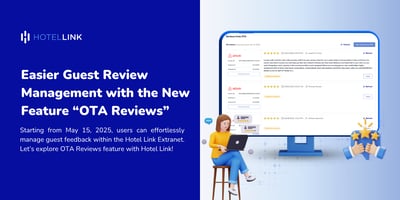Nowadays, hotels are not only focusing on attracting new guests but are also striving to increase...
AEO – The Secret to Getting AI to Recommend Your Hotel to Guests
We are all familiar with SEO (Search Engine Optimization), the effort to optimize our website to climb to the number one position on Google. That spot was once the "throne" of digital marketing. However, the world is rapidly shifting: Artificial Intelligence (AI) doesn't just search; AI answers. The advent of Generative AI tools like Google SGE (Search Generative Experience), Microsoft Copilot, and ChatGPT has reshaped how users interact with information. They no longer scroll through 10 blue search results; they receive a single, synthesized, and personalized answer. And this is the moment for hotels to embrace a revolutionary concept: AEO (Answer Engine Optimization) – the secret to having AI recommend your specific hotel. Join Hotel Link to explore AEO and the steps hotels can take to implement it for better engagement with potential guests.
What is AEO (Answer Engine Optimization) and Why is it the New "Playing Field" for Hotels?
AEO is the content optimization strategy aimed at being selected and used by AI-integrated search engines (Answer Engines) as the direct answer to a user's query. Unlike SEO, which focuses on displaying on the results page, AEO targets gaining placement in areas like featured snippets, People Also Ask, and most importantly, being included in the synthesized answer generated by the AI.

1. SEO for Organic Presence, AEO for Direct Answers: The Dual Strategy in AI Search
Previously, when a potential customer searched for "best 4-star hotel in Da Nang," they would see a list of 10 links. Today, an AI tool will generate an answer like: "Based on reviews and amenities, XXX Da Nang is an excellent choice with an infinity pool and all-inclusive spa packages. This hotel is highly rated for service quality and its proximity to My Khe Beach."
AI has taken the job of a virtual travel consultant. It doesn't just list; it recommends. If your hotel is not included in the AI's answer, you have virtually become invisible to this customer segment.
2. Three Reasons Hotels Should Prioritize AEO Immediately
-
Extreme Personalization: AI has the ability to synthesize data from customer profiles, search history, and personal preferences to deliver the perfect suggestion. The hotel recommended via AEO is the best-fit hotel, not just the best-SEO'd hotel.
-
Increased "Zero-Click" Visibility: More queries are being answered directly on the search page (zero-click search). AEO helps hotels "capture" this answer area, creating strong brand recognition even before the customer clicks.
-
Overcoming OTA Competition: In traditional search results, OTAs (Online Travel Agencies) often dominate the top spots. With AEO, a hotel's proprietary content (from its blog, service pages) has a greater chance of becoming the trusted information source that AI relies on and recommends directly, thereby boosting direct bookings.
The AEO Content Strategy for Hotels: Rethinking Content Creation
To win the AEO game, in addition to creating and optimizing content for the Google Index, hotels must also start creating content for the AI Brain. Your content must be a comprehensive, reliable, and easily synthesizable answer.
1. Focus on the Q&A Structure (Question & Answer)
AI is an answering tool. Therefore, the most effective content is built around the specific questions customers frequently ask.
-
Build Hyper-Detailed FAQs (Frequently Asked Questions): Don't just answer basic questions. Dive into the details that AI will require:
-
"What is the average room rate for a family of 4 at Hotel X during the summer?"
-
"Does Hotel X offer any service packages for travelers with pets?"
-
"What is the distance from Hotel X to the nearest Airport, and how long does it take by taxi?"
-
-
Use Natural, Conversational Language: AI is trained on conversational language. Instead of writing the title "Hotel Services," phrase the title as "What time is breakfast served at your hotel?" or "Can I use the infinity pool at night?" The more the language resembles dialogue, the easier it is for AI to extract and use.
2. Optimize for Structured Data (Schema Markup)
Structured Data (Schema Markup) is the language that search engines use to understand your content most clearly. For AEO, this is the golden key:
-
"HowTo" and "FAQPage" Schema: Mark up instructional sections (e.g., How to book directly for the best offers) and FAQ pages with the corresponding Schema Markup. This helps AI quickly and precisely identify which part of the content is the direct answer.
-
"Hotel" and "Review" Schema: Ensure all basic hotel information (address, price, amenities, reviews) is accurately marked up with Schema. When AI synthesizes an answer, it will seek out this "standardized" information first.
3. The E-E-A-T Principle and AEO: Building Absolute Trust
Google's E-E-A-T (Experience, Expertise, Authoritativeness, Trustworthiness) principle has become exponentially more critical in the AI era. AI only recommends information sources it absolutely trusts.
-
Experience: Demonstrate real-world experiences, e.g., blog posts written by staff about local travel tips, or detailed reviews about the quality of the bedding and the morning coffee - things only those who have experienced it would know.
-
Authoritativeness: Ensure your website receives quality backlinks from reputable news sources, travel blogs, or government tourism organizations. This reinforces your position as a "local expert."
-
Trustworthiness: Room rate information, cancellation policies, and operating hours must always be up-to-date, absolutely accurate, and consistent across all channels (website, Google Business Profile, OTA).
Practical Case Study: AEO and Competitive Advantage (No Specific Evidence Provided)

While quoting specific data from an individual hotel is challenging, we can analyze the AEO strategy based on proven fundamental principles:
1. Optimizing for Experiential Search
Travelers today don't just search for accommodation; they search for unique experiences.
-
Traditional SEO Query: "Hotels with a spa in Phu Quoc."
-
Potential AEO Query: "Which spa in Phu Quoc uses local ingredients and offers traditional massage therapies?"
One hotel implemented AEO by creating an in-depth Spa page, not just introducing services but detailing the origin of the ingredients (local sea salt, forest herbs) and the philosophy of the therapy. When AI synthesized information about "Unique spas in Phu Quoc," it found this page to be the only source providing a detailed and trustworthy answer. As a result, the hotel was included in the AI's direct recommendation list, significantly increasing the number of spa appointments booked and, consequently, a higher direct booking rate.
2. Leveraging the Power of Google Business Profile (GBP)
Google Business Profile (formerly Google My Business) is becoming the information "gatekeeper" for AI.
AI often pulls basic information directly from GBP to answer local queries. Hotels need to:
-
Optimize Attributes in extreme detail: Don't skip any information fields. Example: clearly list amenities like "electric car charging available," "morning yoga classes offered," "supports crypto payment (if applicable)."
-
Respond to Reviews with Information-Rich Content: When responding to positive reviews, reiterate key keywords and validate the guest's experience. Example: "Thank you for the compliment about our rooftop infinity pool. We hope you return to try our new dietary menu at the restaurant!" This helps AI better understand the core value propositions of the hotel.
AEO and Distribution Channels (OTAs): Coexistence or Competition?
In the AEO environment, the battle between Hotels and OTAs becomes more nuanced.
1. Content Segmentation: AEO Exclusivity for Hotels
Hotels should use their website and blog to provide exclusive, in-depth information that OTAs simply cannot offer.
-
OTA: Focus on price, basic features (number of bedrooms, bed type).
-
Hotel (AEO): Focus on the story, personal experience, and "behind-the-scenes" details (e.g., Meet our Head Chef and his family's traditional Pho recipe).
In this way, when AI searches for an answer to "Which hotel has a famous chef known for traditional cuisine," the hotel's website will outperform the OTA's aggregated page. This is how to build "Exclusive Information Value" to attract AI's attention.
2. Leveraging Other AI Platforms (e.g., Virtual Assistants)
AEO is not limited to Google. It extends to virtual assistants like Alexa, Siri, and travel chatbots on Messenger or Zalo.
-
Optimize for Voice Search: Voice queries are typically long, specific, and conversational. Instead of a text search for "Hotel with promotions," a user asks: "Hey Siri, find me a hotel near Tan Son Nhat Airport with rooms under $40 for tonight."
-
Solution: Hotels must ensure content on their website and GBP directly answers these questions. For example: create a landing page optimized for "Last-minute deals for single rooms at [Hotel Name]" and use natural language in the title and description.
Read more: How To Optimize Website for Voice Search: Reaching On-the-Go Travelers
Practical Action: The Roadmap for Effectively Combining SEO and AEO for Hotels
Given the significant shift in search driven by AI, hotels should not view AEO as a replacement for SEO, but rather as a strategic complement. SEO still plays the essential role of ensuring your website is easily discoverable and highly ranked, while AEO ensures your content is selected by AI as the trusted answer. Harmoniously integrating both is the sustainable path for hotels to maintain visibility across all search platforms - from traditional Google to AI tools.
Below is the practical roadmap suggested by Hotel Link for its partners:
Step 1: Information Gap Audit
-
List the questions customers are genuinely asking (via email, phone, chatbot, or online search).
-
Evaluate whether the website's current content provides direct and useful answers to those questions.
-
Action: Identify these "information gaps" and plan to build detailed Q&A content, ensuring it is optimized for keywords (for SEO) while being clear and natural (for AEO).
Step 2: Data and Schema Standardization
Both SEO and AEO require structured data for search engines to accurately understand the content. Use Schema Markup validation tools for all critical pages (homepage, rooms, services, FAQ). Simultaneously, ensure data regarding pricing, address, and amenities is consistently synchronized across your Website, Channel Manager, and Google Business Profile.
Hotel Link assists hotels in automatically synchronizing information between their management system and Google Business Profile, helping to maintain consistency and boost trustworthiness in AI search results.
Step 3: Evaluate and Strengthen E-E-A-T (Experience – Expertise – Authoritativeness – Trustworthiness)
AI and Google's algorithms both prioritize content from reliable sources.
-
Evaluation: Identify the sources currently linking to your website. If the majority are weak sources, invest in developing high-quality content to attract backlinks from reputable travel sites or established media outlets.
-
Strengthening: Publish content written by the actual hotel staff - from receptionists, managers, to chefs - including their real names, titles, and experience. This demonstrates "real people, real experience," reinforcing trust for both the search tools and the readers.
Step 4: Integrate the "Conversational Corner"
Optimize the website chatbot to respond naturally and relevantly to customer needs - this is invaluable data that helps you understand the common questions asked by AI or users.
In parallel, maintain a blog section like "[Hotel Name] A–Z Answers" - where you proactively address frequently asked questions. This content not only supports SEO through natural keyword usage but also allows AI to easily identify and use it as a direct answer (AEO).
Read more: 5 AI Marketing Tools Every Hotel Should Know & How to Use Them Easily
Conclusion: Shifting Mindset to Win in the AI Era
We are living in an exciting era where AI technology is no longer a passive search tool but has become a proactive travel consultant. To succeed in this world, hotels need to be concerned with and maintain both optimization for algorithms and optimization for absolute trustworthiness and relevance
Hotel Link is committed to being your strategic partner in this AEO revolution. Launch your AEO journey today by leveraging our suite of tools - from your Website, Booking Engine, Channel Manager to your Google Business Profile. The foundation of success begins with synchronized, accurate data, high-quality content, and superior customer experience - because this is the most solid basis for AI to "remember," prioritize, and place your hotel brand in the first recommended position for every potential traveler.
Want to optimize your online presence and increase bookings in the AI era? Contact the Hotel Link team to get advice on the right solution for your hotel today!



